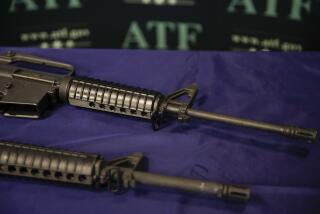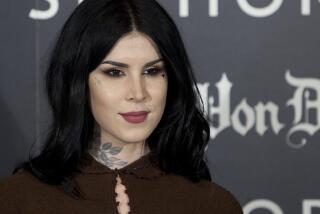Gallery Agrees to Settle Counterfeit Probe
- Share via
ORANGE — An art gallery here has agreed to pay $150,000 in connection with a long-running civil investigation into the murky world of art fraud, the Federal Trade Commission said Wednesday.
Max Klein, a co-owner of Hang-Ups Art Enterprises Inc., was charged last January in U.S. District Court in Los Angeles with selling counterfeit prints. The FTC alleged that the small shop on Katella Avenue was selling bogus art prints that were advertised as authorized pieces by well-known artists, including Marc Chagall, Joan Miro and Pablo Picasso.
The FTC last year sought an injunction barring Hang-Ups Art from further sales of bogus prints and the creation of a fund to refund money to customers who’d purchased the allegedly fake prints.
Klein on Wednesday repeated his claim to have done nothing wrong, but declined to discuss the case. His attorney maintained that the company was misled by its suppliers and an art consultant who had authenticated the disputed prints.
The Hang-Ups Art case stemmed from a lengthy FTC probe--dubbed Operation Bogart, short for bogus art--that began in New York City in the late 1980s and since has stretched to California and Honolulu. The continuing investigation involves art suppliers and retailers, and focuses on sale of bogus prints that are increasingly easy to produce, given advances in printing and copying technology.
Although Klein wouldn’t talk about the settlement that now must be approved by a federal judge in Los Angeles, his attorney said it was driven by economic forces.
“It’s very expensive to litigate--way more expensive than the settlement,” said David Paul Steiner, who specializes in art law. “But the settlement doesn’t change Hang-Ups Art’s stand as far as wrongdoing. They absolutely didn’t do anything wrong.”
Steiner said the company has agreed to create a $150,000 fund that will be used to reimburse customers who bought allegedly fake prints from the store in Orange.
Consumers paid between “several hundred and several thousand dollars” for prints that the FTC maintains were frauds, Steiner said. He said the FTC had targeted just a fraction of the nearly 200 titles sold by the shops. He declined to specify how many.
He described the shop owners as businessmen who were duped by “suppliers they had been led to believe were the most credible and well-respected suppliers in the art business. . . . They even got the stamp of approval from a well-known and respected art consultant who turned out to either be not aboveboard or incompetent.”
The proposed settlement includes “strong prohibitions against false claims about the nature of any artwork” that Hang-Ups sells in the future, said Sue Frauens, acting regional director for the FTC in Los Angeles.
“What makes this case interesting is that, in the past, we’ve generally gone after businesses where a very large percentage of art being sold is fraudulent,” Frauens said. “In this case, we’re not disputing the fact that they sold legitimate art. What we found was that a small percentage of what they sold was misrepresented as far as the authenticity.”
*
Art experts say the case underscores the risks that unsophisticated buyers take when they purchase prints supposedly created by well-known artists.
“When Picasso and Chagall are mentioned, those names should raise red flags,” said Mary Arturo, exhibition coordinator for the Newport Harbor Art Museum. “A famous name like Picasso connotes both safety and sophistication on the part of the collector. But the reality is, if they were truly a sophisticated collector, they’d understand you can’t buy a Picasso in a mall.”
Maggi Owens, curator at the Guggenheim Gallery at Chapman University, suggested that buyers check with a third party, especially on seemingly inexpensive prints from well-known artists: “If the price doesn’t seem right, then you’re probably getting what you paid for.”
*
Hang-Ups Arts was drawn into the federal probe when investigators found it had done business with Leon Amiel Publisher Inc., a New York-based supplier that eventually was found guilty of creating and distributing fake artwork. The FTC used court orders to seize more than 75,000 counterfeit artworks in connection with that case, and later won fraud and conspiracy convictions against three of the firm’s members.
The FTC charged in January 1995, that Hang-Ups Art sold purported limited-edition prints attributed to artists like Chagall, Miro and Picasso. The complaint alleged that the company conducted public auctions for various charitable organizations, allegedly representing that the works were limited-edition prints.
Arturo, the art expert, cautioned consumers to demand “a paper trail every time you see a piece of art you want to purchase. If it’s a really expensive piece, then, in essence, title has to transfer, just like in a real estate transaction. If you’re not careful you can find out that you’ve spent thousands of dollars for a piece of paper that’s probably worth about $3.”
More to Read
The biggest entertainment stories
Get our big stories about Hollywood, film, television, music, arts, culture and more right in your inbox as soon as they publish.
You may occasionally receive promotional content from the Los Angeles Times.










